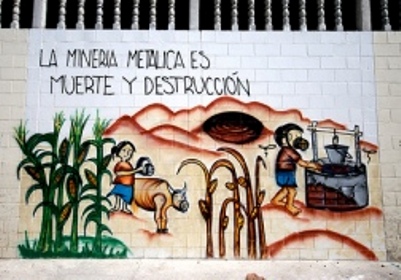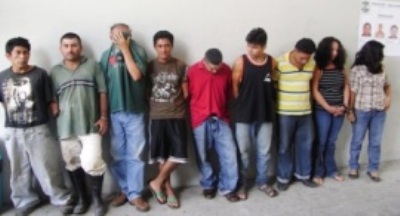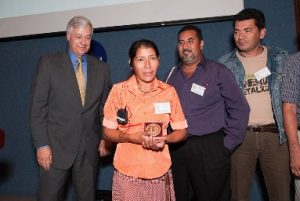Sister Cities
The Movement Against Mining Marches On; An Upate
Pac Rim Faces Off with the Government of El Salvador
After months of waiting, arbitration in the Pacific Rim case officially began in Washington D.C. last month. On May 31st and June 1st lawyers representing Pac Rim Cayman and the Salvadoran government went head to head before a tribunal of three international arbitrators. The case was heard at the International Centre for Settlement of Investment Disputes (ICSID), a branch of the World Bank.
The first round of hearings was to decide whether the case would be accepted by the tribunal and should proceed to a second round where evidence will be presented. While both sides based their arguments in the technicalities of CAFTA provisions, the government’s lawyers also argued that the real reason Pac Rim has not received an exploitation permit is because they failed to fulfill the necessary steps and requirements.
Present at the hearings were not only the arbitrators and lawyers, but also Thomas Shrake, CEO of Pac Rim, as well at least three representatives from the U.S. State Department. At the conclusion of the hearings the arbitrators announced that they would make a decision by August 2nd as to whether the case will continue to the second round of hearings.
To watch the recording of the procedures go to the ICSID website. For a more thorough analysis of each day of hearings see the Voice on the Border Blog here and here.
Transparency and the ICSID
According to CAFTA all dispute hearing filed through the trade agreement must be public. However, it is up to the ICSID to decide how to make them public. Usually a separate room is made available in the ICSID headquarters in Washington with a closed circuit tv broadcast of the proceedings. For the Pac Rim vs. Government of El Salvador trial there was apparently a month long debate within in the ICSID whether or not to live stream the trial on the internet.
 In an effort to make the hearings as accessible to the public as possible, Sister Cities organized call in days to the ICSID asking that the hearings be made public or be posted online. Supporters from across the U.S. and Canada called the ICSID and in the end our voices were heard. The ICSID decided to live stream both days of hearings in Spanish and English. This was a victory both because it made it possible for the hearings to be watched by anti-mining activists in El Salvador, the U.S. and Canada and because live streaming the proceedings apparently cost Pac Rim $6,000.00.
In an effort to make the hearings as accessible to the public as possible, Sister Cities organized call in days to the ICSID asking that the hearings be made public or be posted online. Supporters from across the U.S. and Canada called the ICSID and in the end our voices were heard. The ICSID decided to live stream both days of hearings in Spanish and English. This was a victory both because it made it possible for the hearings to be watched by anti-mining activists in El Salvador, the U.S. and Canada and because live streaming the proceedings apparently cost Pac Rim $6,000.00.
According to the Center for International Environmental Law, this was the first ICSID case ever broadcast on the internet.
Thank you to everyone who called in and congratulations on a job well done.
Commerce Group Suit Moves to the Next Stage
The Milwaukee based companies Commerce Group Corp. and San Sebastian Gold Mines Inc. are also suing the Salvadoran government for $100 million. While they filed their notice of intent last year, it was assumed the company was waiting to see the outcome of the Pac Rim case before proceeding. However, on July 1st the ICSID announced that they have named the arbitrators who will hear the case. The three arbitrators are Dutch, Canadian and Argentine. According to the Diario de Hoy, which covered the announcement, the disputing parties now have 60 days to prepare themselves for the first hearing.
Growing Resistance in the U.S. and Canada
On June 3rd nine of the organizations that make up the coalition working in solidarity with the National Roundtable Against Mining in El Salvador came together in Washington D.C. to solidify our campaign against the Pac Rim Cayman suit. Sister Cities had five representatives at the meeting. It was an exciting opportunity for the coalition to finally meet face to face and the end result was an impressive plan for moving our work forward. If you or your committee is interested in more information about how to organize and coordinate with this work, let us know and we can get it to you.
While in Washington, Sister Cities, CISPES and Institute for Policy Studies met with the State Department. We were received by David Wolf, Deputy Director of Central American Affairs, Marc Hove from the El Salvador desk, Aaron Spencer from Oceans, International Environment and Scientific Affairs, Jennifer Thornton of Treaties Affairs, and two interns.
Our goal was to find out why the U.S. government does not take a more active role in sanctioning Pacific Rim as a U.S. based company acting unethically abroad. In the meeting David Wolfe talked about how the role of the State Dept is to encourage and support a level playing field for U.S. business interests abroad and said that the Embassy and DOS only intervenes when a company has broken U.S. or local law. When pressed as to whether the DOS or Embassy would take action or impose sanctions if the company were proven to have committed human rights abuses or other ethics violations, Wolfe said they would be "very interested to hear about it" but only would act if they were given proof of a U.S. law being broken.
For us, this stance is not enough. If Pac Rim is supposedly a U.S. company and can sue under US trade law, then the U.S. government has the obligation to oversee the company’s actions and investigate accusations of unethical behavior and human rights violations.
Arrests Related to Cabañas Violence
On July 1st the Civilian National Police (PNC) in coordination with the Attorney General’s Office captured eleven people implicated in the murders of activists in Trinidad, Cabañas. Of those detained, two are being charged as the intellectual authors of the crime.

The arrests come after more than six months of pressure from the National Roundtable against Mineral Mining, government institutions like the Ombudsman for Human Rights, international organizations and even U.S. Congressmen on local authorities to carry out a thorough and fair investigation.
However, despite these demands, the investigations have proven negligent and incomplete. In public statements both the head of the Elite Division of Organized Crime, Rodolfo Delgado, and the Director of Investigations, Howard Cotto, attributed the murders to “family feuds” and refused to connect them to the conflict caused by Pacific Rim. This stance ignores testimony and evidence that proves that before the mining companies entered the region these conflicts did not exist. While two of the suspects arrested are being accused of ordering the crimes, there has been no investigation into where they got the large amount of money they used to pay for the assassinations. More importantly, blaming the violence in Cabanas on ll Salvadorans and a family feud does not address the threats of violence members of Radio Victoria, the Environmental Committee of Cabañas and other anti-mining leaders in the region have received.
In light of these arrests The National Roundtable against Mineral Mining has reiterated the need to “identify, judge and condemn all the intellectual and material authors of all the assassinations, attempts and death threats against environmentalists opposed to the mining projects of Pacific Rim in Cabañas.”
For more news about the arrests see: La Prensa Grafica, Diario El Mundo 1 and Diario El Mundo 2, Diario CoLatino, La Pagina, ContraPunto.
For the complete National Roundtable against Mineral Mining statement click here.


